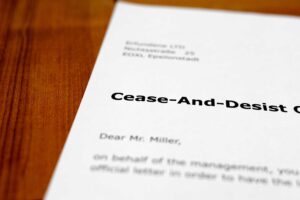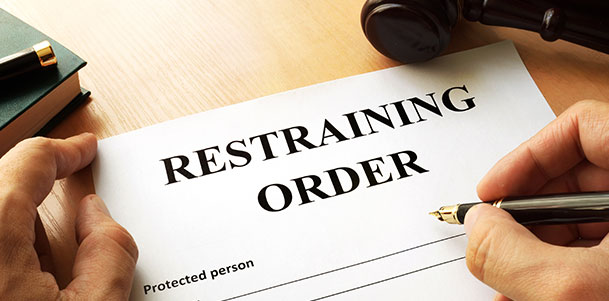What’s a Restraining Order?
A restraining order is a legal document that stops an individual from approaching another within a certain distance. Typically, these injunctions are meant for situations where a person requesting the restraining order fears bodily injury.
Restraining orders filed in response to less severe interactions are usually not appropriate. They may even expose the petitioner to a civil lawsuit.
 Restraining Orders for Unwanted Internet Attention
Restraining Orders for Unwanted Internet Attention
Clients often ask about the best way to handle negative online interaction and retain a restraining order lawyer. Essentially, should you get a restraining order to get another party to stop posting something?
In many cases, a restraining order is not the best solution because these cases rarely rise to the level of cyber harassment.
What is Cyber Harassment?
Harassment only occurs only when the conduct meets three criteria:
- It’s directed at a specific person
- It causes substantial emotional distress
- It serves no legitimate purpose
Social media posts generally do not count as harassment because they are not “directed at” a specific person but are comments to the general public—no one person in particular.
Further, “substantial emotional distress” must be “markedly greater” than unhappiness or uneasiness that is commonplace in our daily lives, according to Wallace v. Van Pelt.
 Restraining Orders for Stalking
Restraining Orders for Stalking
Stalking, whether in person or online, is illegal. And since actual stalking can lead to injury or death, if you feel that you are being stalked and are receiving personalized threatening messages, contact law enforcement.
However, the term ‘stalking’ gets thrown around a lot and results in far too many unnecessary petitions for restraining orders. These false restraining orders can destroy reputations, careers, and should be vigorously defended against.
Likewise, there are some instances when an individual believes that he or she is being stalked but is actually being defamed. A defamation lawsuit may be a more effective way to secure the result you need.
 Cease and Desist Letters
Cease and Desist Letters
A cease and desist letter is sent to a person demanding they stop (“cease”) unlawful, unethical, or unwanted activity. The letter also requests that the person refrains from this activity (“desist”) in the future. A cease and desist letter is a warning about potential legal action.
Sometimes a well-crafted cease and desist letter from an attorney is enough to stop defamatory attacks.
Regardless of whether you want to defend against an unjustified restraining order or discuss the possibility of a defamation case rather than a restraining order, J Haskins Law can help.
 A Defamation Lawyer for Restraining Orders
A Defamation Lawyer for Restraining Orders
Defend against unjustified restraining orders:
You deserve a strong defense if you are accused of cyber harassment, stalking, or bullying. Suppose a false or inaccurate restraining order is hurting your reputation, career, or standing. You can also lose your rights to own a gun. In this situation, an attorney can help clear things up, get the order rescinded, and recover compensation for the harm done.
Considering filing a restraining order?
If you think someone’s conduct online or in-person caused you harm but not to the level that you fear physical injury, a defamation claim may be the better option. This can stop the behavior in question, and a financial judgment in your favor can go a long way to restoring the damage to your character.
The truth is always the best defense, no matter which side of a restraining order you are on. Attorney Jesse Haskins is here to advise you and help bring the truth to light.
“Amazing Attorney!
Will definitely have him speed dial for any legal matter. He was fast, through! Great results!”
- Anka M.
“Outstanding Service.
I appreciated their prompt response to my calls and the fact all legal options available to me were fully explained.”
- Frank L.
“Just a great attorney.
Not only was my issue resolved, Mr. Haskins provided me with excellent advice to use going forward.”
- Stephen F.
When Restraining Orders Should Be Defamation Cases
Suppose someone is posting false, malicious statements about you to a third party (such as a website, Facebook, Twitter, and other social media platform). In that case, you may pursue compensation for damages caused by these defamatory statements.
Restraining orders are excellent for helping to protect someone from another person’s threatening behavior physically. When the threatening behavior is causing you to lose clients or customers, you probably have grounds for a defamation case.
 Do I Have a Defamation Case?
Do I Have a Defamation Case?
Defamation occurs when someone writes or talks about you in such a way as to damage your business or besmirch your character.
Is someone saying things about you that are:
- False?
- Malicious or harmful?
- Posted or published to a third party?
- Posted even when the person knows that they are untrue?
- Causing you financial or emotional distress?
The individual who is posting false statements can be held liable if they knew (or should have known) that the information was untrue before sharing it. In legal terms, this individual is negligent.
Protect Your Reputation
J. Haskins Law handles restraining order and defamation cases. When your reputation is on the line, it’s time to call an attorney who understands defamation, liability, and negligence law. Attorney Jesse Haskins evaluates your situation, secures necessary evidence, and seeks compensation from the liable party. You have the peace of mind that your name and reputation are protected.
Call 727-371-9730 / Contact Haskins Law
Contact Us
"*" indicates required fields
